August 12, 2020, by Kathryn Steenson
Horticulture
As the grounds of stately homes and houses begin opening up after lockdown, we’re taking a look at horticulture, which can be broadly defined as “the art or practice of garden cultivation and management”. Horticulture features prominently in the estate papers of local aristocratic families, who had the space and resources to create extensive gardens and to employ the best gardeners and most up-to-date technology.
Many employers were happy to leave horticultural planning and management to the professionals. The 3rd Duke of Portland employed horticulturalist and author William Speechly (1735-1819) as head gardener at his Welbeck Abbey estate in Nottinghamshire. Speechly was particularly skilled at growing pineapples (an 18th status symbol) and grapes, but this letter to the duke gives an insight into the problems he faced during one particularly difficult season.
He writes: “I know your Grace will be sorry to hear that I have lately seen some of our old enemies, those vile insects we had on the pines……I set several of the late shown pines last year (while infected) in the Vinery, & Nectarine Frame, by way of keeping them back; after they had stood in those places several weeks, I took ‘em out of their potts in order to dip them, leaving earth, insects &ca behind: and Behold I have lately found several of them on both Nectarine and Vine Trees, alltho they were expos’d to the Weather in Winter; I hope they will not be able to increase on those plants as I see no young ones.”
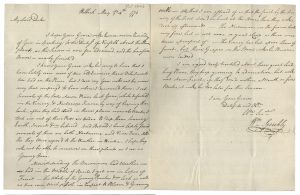
Letter from William Speechly, Welbeck Abbey, Nottinghamshire, to the, 3rd Duke of Portland, 4 May 1772 (Ref: Pw F 8444)
Growing fruit more accustomed to a milder climate was particularly challenging, even for the skilled gardener. Speechly designed this heated frame for forcing peaches to grow. Inside, a single fireplace provided heat for the peaches via a flue, which ran the length of the frame.
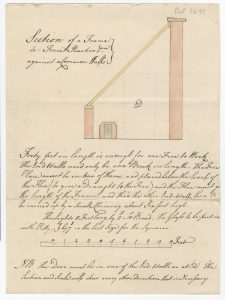
Diagram of a frame to force peaches to grow sent by William Speechly to the 3rd Duke of Portland, c.1795. (Ref: Pw F 8491)
Margaret Cavendish (1715-1785), Duchess of Portland and mother of the 3rd Duke was more personally involved in the development of her gardens at Bulstrode Park, Buckinghamshire. She introduced new plants to the parkland, many of which were collected for her from all over the world. Her papers (Pw E) include notes on fungi, horticultural bills, and lists of plants.
One plant list relates to the delightful sounding ‘Duck Island’. Unfortunately, we don’t know where on the estate this feature was located but it was clearly well stocked.
The commercial side of horticulture is represented by this descriptive business card for Christopher Knuck, gardener and florist. The dried vegetables he supplied included Windsor beans, green peas, and French beans, all of which needed to be soaked in water before being prepared for consumption.
The Horticultural Advertiser was an advertising newspaper for the horticultural trade, first published in1883. It offered nurserymen, seedsmen, horticultural equipment manufacturers and service providers a place to advertise to a specialist market, as well as editorial features tailored to their business.
Those wishing to acquire professional training in horticulture could enrol on an ‘Intermediate Horticulture’ course at the Midland Agricultural College, Sutton Bonington (later the Faculty of Agriculture at the University College Nottingham). Prospectuses from the 1940s and 1950s show that students would have attended lectures in zoology, botany, chemistry and geology, as well as carrying out field work.
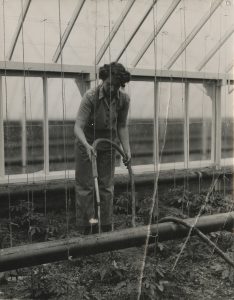
Student in the greenhouses at the Sutton Bonington Campus tending to cucumber and tomato plants, c.1940-1950. (Ref: UMP/5/108)
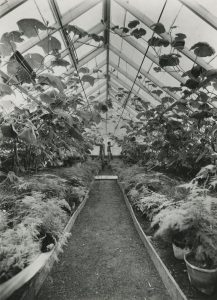
Students in the greenhouses at the Sutton Bonington Campus tending to cucumber and tomato plants, c.1940-1950 (Ref: UMP/5/113)
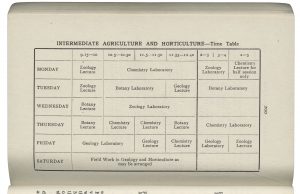
Time table for the ‘Intermediate Agriculture and Horticulture’ course, taken from the University College Prospectus 1947-1948 (Ref: UoNC Not 5.C4)
During the Second World War people were encouraged to grow their own food to supplement rationing, which had been introduced in 1940. The British Ministry of Agriculture produced this poster – one of several in a series – encouraging the public to grow root vegetables.
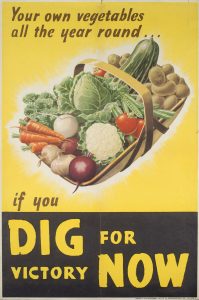
Second World War poster ‘Dig for Victory’ encouraging the public to grow their own vegetables all year round, c.1939-1945. (Ref: WWP 11/6)
The University of Nottingham collects archival material relating to the history of the University and its predecessors, including the Midland Agricultural and Dairy College, and the history of the East Midlands. These items are just a few from the collections held at Manuscripts & Special Collections at Kings Meadow Campus. The Reading Room at Kings Meadow Campus is currently closed due to Coronavirus, but we are running a limited enquiry and reprographics service. For more information, see www.nottingham.ac.uk/mss or email mss-library@nottingham.ac.uk
No comments yet, fill out a comment to be the first

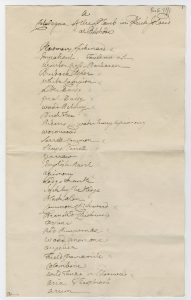
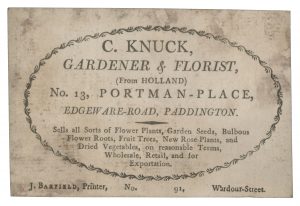
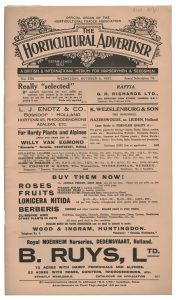
Leave a Reply